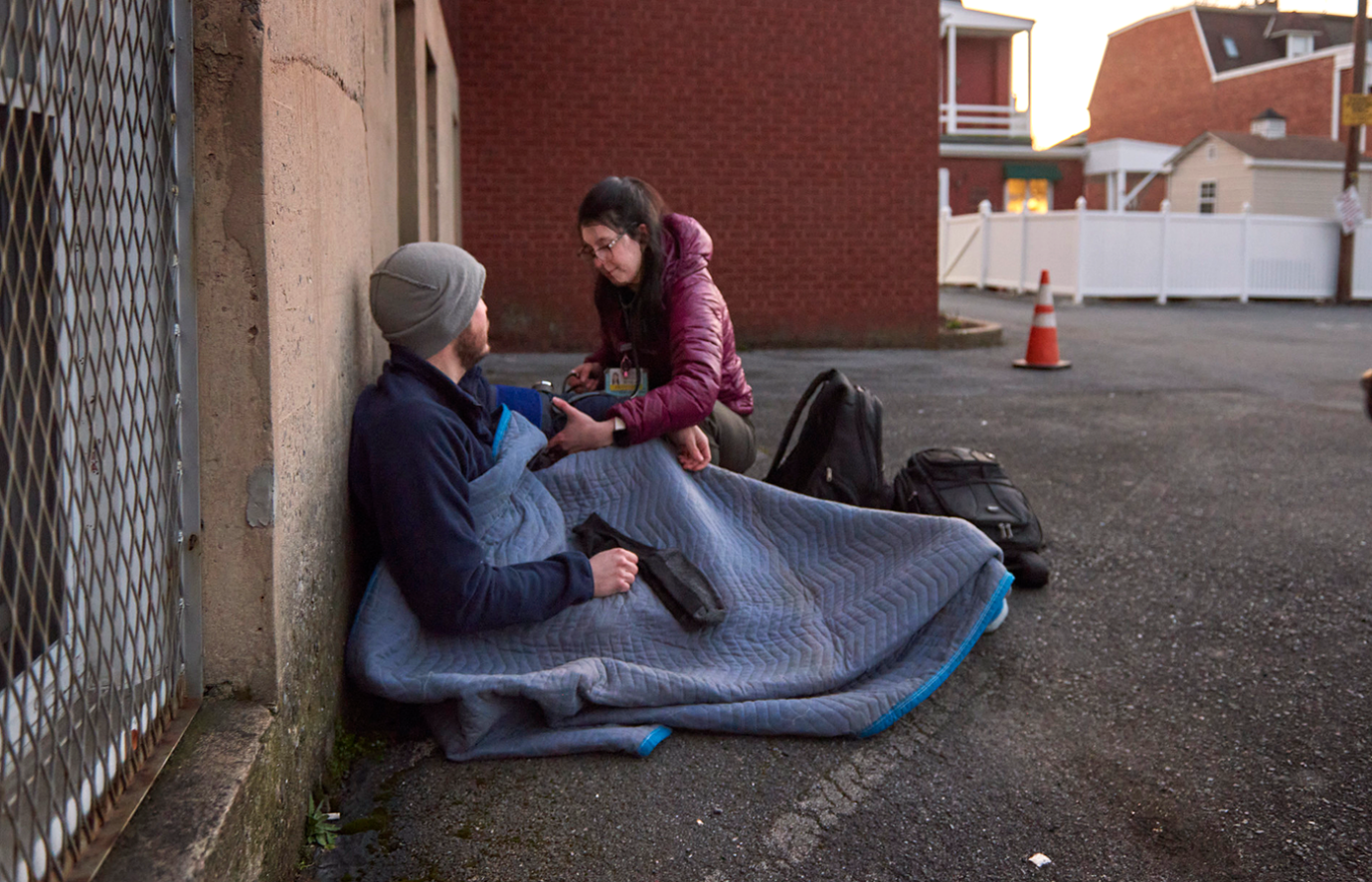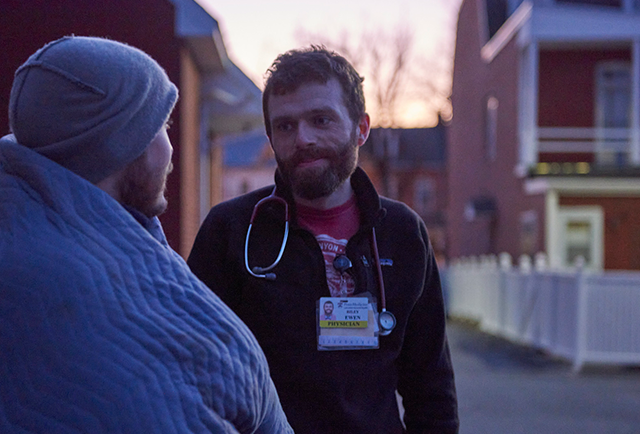

“Tyler,” who was sleeping on the streets in downtown Lancaster, Pa., had endured a long history of trauma in his relatively short life.
One cool fall evening, Tyler, whose name has been changed to protect his identity, met someone who would gradually earn his trust: a family medicine resident rounding as part of Penn Medicine Lancaster General Health’s Street Medicine program.
The physician saw resilience and hope hidden beneath the evidence of the hardships that Tyler had experienced. At first, he admits that he felt powerless to help his new patient. So he started by listening, and by telling Tyler he was not alone.
LG Health’s Street Medicine team began seeing patients like Tyler in spring 2022. The program aims to engage unsheltered individuals who might be hesitant to pursue traditional medical care in an effort to prevent adverse health outcomes and ultimately improve overall health and well-being.
It can be difficult to say for certain how many people are experiencing homelessness in Lancaster County at any given time. While the latest “point-in-time” count, conducted in early 2022, found 472 individuals who were unsheltered or in emergency shelter, the actual number is likely much higher.
LG Health’s Street Medicine team, which includes medical residents, attending physicians and others, rounds on foot twice monthly at downtown Lancaster locations where potential patients might gather. In its first eight months, the team saw a total of 60 patients at those locations, providing basic physical exams and mental health care, treating acute concerns, and performing minor procedures, such as podiatry services. The team also prescribes medications as needed.
The Street Medicine program is a partnership between the Lancaster General Hospital Family Medicine Residency Program and LG Health’s Community Health and Wellness department. The team also collaborates with a number of community organizations that serve people who are experiencing homelessness.
Camden Towne, DO, a third-year Family Medicine resident, said the Street Medicine program provides accessible health care with an emphasis on compassion. The team members have completed trauma-informed trainings and use care to show respect for the individuals they approach. While they dress casually, the physicians wear stethoscopes so they are easily identifiable.
“We are providing basic medical care and establishing relationships with many of the folks who are out there,” Towne said. “Many of them have medical needs that are not being addressed, or social needs that are undiscovered. Through this program, they are seeing that people really do care.”

Family Medicine residents like Samantha Bush, DO, regularly round with the Street Medicine team as part of the Lancaster General Hospital residency program’s core curriculum. The program is currently developing a community health area of concentration for future residents whose interest may be piqued.
‘We saw the need’
Towne and his fellow residents began discussing the possibility of a street medicine program in early 2021. They partnered with Community Health to launch the program, ultimately receiving a $10,000 seed grant, as well as additional guidance and support, from the Pittsburgh-based Street Medicine Institute.
“We saw the need of visible homelessness in our community, especially in Lancaster city, and we wanted to respond in a meaningful way,” Towne said. “As family physicians, we try to meet our patients where they are, even if it’s a place where most people don’t want to be.”
The institute, which began in 2009, defines “street medicine” as providing health care directly to people where they are living and sleeping on the streets, through outreach services such as walking teams and ad hoc outdoor clinics. Its founder, Dr. Jim Withers, and other staff recently visited Lancaster to provide education to LG Health’s Street Medicine team and will continue to support the program as it grows.
LG Health’s Street Medicine program is funded solely through grants. In addition to the Street Medicine Institute grant, LG Health received $24,853 from the Pennsylvania Housing Finance Agency’s Home4Good Program. These initial grants cover supplies and medications, including prescriptions. Residents and attending physicians participate as part of their role at LG Health.
LG Health works closely with community partners to ensure that the Street Medicine team is focusing its efforts appropriately and not duplicating existing initiatives. Those partners include the Lancaster County Homelessness Coalition, the Lancaster Food Hub and Water Street Mission, which provides a nurse to round with the team.

LGH Family Medicine residents round with the Street Medicine team as part of the residency program’s core curriculum, Towne said. The program is currently developing a community health area of concentration for future residents whose interest may be piqued.
“Rounding with the Street Medicine team is really educational for our residents,” he said. “We talk a lot about social determinants of health in medical education. This gives our residents a front row seat to some very real and very raw life situations.”
On their biweekly rounds, the small team of residents sees people at a downtown park and a church that provides overnight shelter. They are joined by attending physicians from the Family & Community Medicine Department, a nurse and outreach worker. The team typically approaches people in pairs, introducing themselves and inquiring about potential health-care needs.
They focus on taking time to listen closely to each individual and gain a greater understanding of their needs. In general, they have found that people are very open about their personal problems, including sensitive issues. Sleeping next to others on the street night after night leaves little room for secrets.
“Relationship building is paramount for our team,” said Jessica Klinkner, Manager, Community Health and Wellness. “Even if we aren’t able to do anything to improve someone’s physical health on the first encounter, we are planting a seed so they might come to us in the future.”
Providing care with a dose of dignity
For its first several months, the team focused on building trust through interactions with potential patients. Between April 2022 — when the team officially began documenting those interactions — and Dec. 31, 2022, the team saw 60 unique patients, for a total of 130 patient encounters.
Eleven of the 60 patients interacted with the team three or more times. Since engaging with the program, the average number of Emergency Department visits for those patients decreased 45%. After an encounter with the Street Medicine team, four patients established a primary-care relationship with LG Health’s Family Medicine Downtown.
Those patients include Tyler, who now regularly sees his new physician for essential mental health care, preventative care and medications. Tyler’s physician serves as his trusted partner, connecting him to community resources that align with the goals he has identified for himself.
In addition, 29 patients have engaged with at least one related service, including social workers with LG Health’s Ambulatory Complex Care Team or the LG Health Physicians Comprehensive Care medical practice. Patients also have visited a mobile hygiene unit staffed by community paramedics, a local free clinic, and a federally qualified health care center.
While they are glad to help connect these patients with health care, the team also recognizes that some people will never seek care in the traditional health-care system, and they do not place pressure on them to do so.
Attending physician Jared Nissley, MD, who practices at Comprehensive Care, said the team hopes to secure additional grant funding to grow the program to include more team members, more frequent rounding and coverage of a larger geographic area. The team also would like to expand the services it provides, such as preventive care, lab work and suboxone treatment for opioid use disorder.
“LG Health’s mission is to advance the health and well-being of the communities we serve, and that includes everyone living in those communities,” he said. “Our Street Medicine program removes barriers and increases access to personalized medical care, with a dose of dignity as well.”








